
Current Tropical Medicine Reports
Scope & Guideline
Fostering collaboration for a healthier world.
Introduction
Aims and Scopes
- Infectious Disease Epidemiology:
The journal highlights studies on the epidemiology of tropical infectious diseases, including their transmission dynamics, prevalence, and impact on populations. - Public Health Interventions:
Research focused on the effectiveness of public health interventions, vaccination strategies, and health policies aimed at controlling tropical diseases and improving health outcomes. - Vector-Borne Diseases:
A significant focus on the biology, ecology, and control of vector-borne diseases, such as malaria, dengue, and Zika virus, including studies on vectors like mosquitoes and ticks. - Neglected Tropical Diseases (NTDs):
The journal emphasizes the study of neglected tropical diseases, exploring their pathogenesis, socio-economic impacts, and strategies for control and eradication. - Global Health and Disparities:
Research addressing health disparities in tropical regions, particularly among vulnerable populations, and the implications of socio-economic factors on disease outcomes. - Innovative Technologies in Medicine:
Exploration of new technologies, including digital health tools and molecular diagnostics, for improving disease surveillance and public health responses.
Trending and Emerging
- Impact of Climate Change on Health:
Recent publications emphasize the effects of climate change on the epidemiology of tropical diseases, highlighting how shifting environmental conditions affect vector populations and disease transmission. - Public Health Informatics and Technology:
There is a growing focus on the application of digital health technologies and informatics tools for disease surveillance and management, particularly in the context of public health responses to epidemics. - One Health Approach:
Research integrating human, animal, and environmental health perspectives is gaining prominence, reflecting the interconnectedness of health issues in tropical regions. - Mental Health Impacts of Infectious Diseases:
Emerging studies are exploring the mental health consequences of infectious diseases and pandemics, particularly in vulnerable populations affected by tropical diseases. - Health Disparities and Equity:
An increased emphasis on understanding and addressing health disparities, particularly in low-and-middle-income countries, is evident, focusing on social determinants of health.
Declining or Waning
- Traditional Tropical Diseases:
Research on traditional tropical diseases such as leprosy and yaws has seen declining attention, possibly due to increased focus on emerging infectious diseases and NTDs. - Single Disease Focus:
There is a noticeable decrease in papers concentrating solely on single diseases, as interdisciplinary approaches and integrated disease management strategies gain traction. - Basic Science Studies:
Basic science research related to tropical diseases, such as fundamental microbiological studies, appears to be waning in favor of applied research that addresses immediate public health challenges. - Epidemiological Studies without Intervention Focus:
Epidemiological studies that do not propose or evaluate public health interventions are becoming less common, as emphasis shifts towards actionable research that can inform policy and practice.
Similar Journals
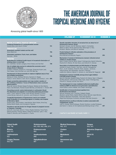
AMERICAN JOURNAL OF TROPICAL MEDICINE AND HYGIENE
Leading the charge in combating tropical diseases.The American Journal of Tropical Medicine and Hygiene, published by the American Society of Tropical Medicine & Hygiene, serves as a pivotal platform for the dissemination of innovative research and clinical findings in the realm of tropical medicine and health. With an illustrious history dating back to 1945, this journal has maintained its commitment to enhancing global health, particularly in the fields of Infectious Diseases, Parasitology, and Virology. It currently boasts an impressive impact factor and ranks in the Q1 category for Parasitology and Q2 for Infectious Diseases and Medicine (miscellaneous), highlighting its academic prominence. The journal's mission is to advance research, showcase cutting-edge studies, and foster collaboration among researchers, healthcare professionals, and students dedicated to tackling tropical diseases and improving public health worldwide. While access is not open, the journal remains a critical resource for anyone looking to stay informed on the latest advancements in the field.
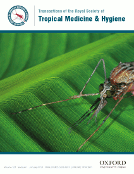
TRANSACTIONS OF THE ROYAL SOCIETY OF TROPICAL MEDICINE AND HYGIENE
Elevating Standards in Tropical Medicine and Public HealthTransactions of the Royal Society of Tropical Medicine and Hygiene is an esteemed academic journal published by Oxford University Press, that has been a cornerstone in the field of tropical medicine since its inception in 1907. With an ISSN of 0035-9203 and an E-ISSN of 1878-3503, this journal endeavors to advance knowledge in the disciplines of Infectious Diseases, Parasitology, and Public Health, among others. Ranked Q2 in four key categories according to 2023 journal metrics, it holds a reputable position in its field, as evidenced by its Scopus rankings, notably achieving a 62nd percentile in Public Health and a 60th percentile in Parasitology. The journal is crucial for researchers and healthcare professionals aiming to address pressing global health issues that impact tropical regions. Though it does not offer open access, its rigorous peer-review process ensures that only the highest quality research articles are published, fostering an essential scholarly dialogue that contributes to the improvement of health standards worldwide. We invite you to explore and contribute to this influential platform that shapes the future of tropical medicine and hygiene.

Infectious Diseases of Poverty
Innovating public health strategies for a healthier tomorrow.Infectious Diseases of Poverty, published by BMC, is a leading open-access journal dedicated to addressing the critical intersection of infectious diseases and poverty. Since its inception in 2012, this influential journal has contributed significantly to the fields of public health, infectious diseases, and environmental health. With impressive rankings placing it in the top quartile (Q1) across multiple categories—including Infectious Diseases and Public Health, Environmental and Occupational Health—it stands as a vital resource for researchers and practitioners alike. The journal's commitment to accessibility ensures that high-quality research is available to a global audience, fostering collaboration and knowledge sharing. Based in the UK, Infectious Diseases of Poverty aims to publish innovative research that sheds light on the complexities of infectious diseases and their socio-economic determinants, ultimately working to improve health outcomes in vulnerable populations around the world. With its robust impact factor and esteemed standing within the academic community, this journal serves as an essential platform for advancing the understanding and management of infectious diseases related to poverty.
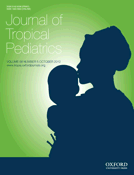
JOURNAL OF TROPICAL PEDIATRICS
Elevating knowledge for healthier futures in tropical pediatrics.JOURNAL OF TROPICAL PEDIATRICS, published by Oxford University Press, stands as a critical platform for the dissemination of research and clinical advancements in the field of tropical pediatrics. With a rich history dating back to 1955, this journal serves as a significant contributor to our understanding of health issues affecting children in tropical and subtropical regions, focusing on infectious diseases, pediatric care, and child health. It currently holds an impressive Q2 ranking in three categories: Infectious Diseases, Medicine (miscellaneous), and Pediatrics, Perinatology and Child Health, placing it among the top journals in its field. Featuring both formative research and applied studies, the journal aims to address the unique challenges posed by pediatric care in tropical environments. Its inclusion in an esteemed database ensures a broad dissemination of critical knowledge to researchers, healthcare professionals, and students alike, promoting a collaborative approach to improving child health outcomes globally.
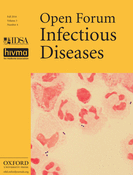
Open Forum Infectious Diseases
Innovating solutions for evolving health challenges.Open Forum Infectious Diseases (ISSN: 2328-8957; E-ISSN: 2328-8957) is a leading open-access journal published by Oxford University Press, dedicated to advancing the field of infectious diseases. Since its inception in 2014, the journal has provided a platform for researchers to disseminate impactful findings in a rapidly evolving domain, achieving a remarkable Q1 ranking in both the Infectious Diseases and Oncology categories as of 2023. The journal encourages rigorous and innovative research, contributing significantly to global health discussions and informing best practices in clinical settings. As an open-access journal, it ensures that its content is accessible to a wide audience, fostering collaboration and knowledge sharing among researchers, professionals, and students alike. Positioned in the heart of the United States, Open Forum Infectious Diseases serves as a critical resource for the academic community, and its continued commitment to quality and relevance secures its status as an essential publication in the field.

Research and Reports in Tropical Medicine
Exploring the frontiers of tropical disease solutions.Research and Reports in Tropical Medicine is a distinguished open-access journal dedicated to advancing knowledge in the field of tropical medicine. Published by DOVE MEDICAL PRESS LTD, this journal operates under the ISSN 1179-7282, facilitating global access to quality research since its inception in 2010. With a commitment to disseminating innovative findings and critical analyses, the journal serves as a vital platform for researchers, professionals, and students engaged in the diverse aspects of tropical diseases and public health challenges. Research and Reports in Tropical Medicine welcomes original research articles, reviews, and case studies that contribute to an improved understanding of health issues in tropical regions, making it an essential resource for those aiming to impact global health positively.
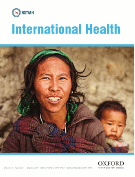
International Health
Illuminating Health Systems WorldwideInternational Health, published by Oxford University Press, is a leading peer-reviewed journal dedicated to the exploration and advancement of health and healthcare practices across the globe. With its ISSN 1876-3413 and E-ISSN 1876-3405, the journal focuses on a wide variety of topics within the realm of international health, catering to a diverse audience of researchers, professionals, and students. It currently holds a prestigious position in the 2023 quartile rankings, being categorized as Q1 in Health (Social Science) and Q2 in both Medicine (Miscellaneous) and Public Health, Environmental and Occupational Health, reflecting its significant impact within these fields. Although the journal is not open access, it remains a valuable resource, providing crucial insights and fostering discussion around health systems, public policy, and global health challenges from 2009 to 2024. With a strong emphasis on empirical research and innovative practices, International Health serves as a vital platform for knowledge dissemination and scholarly discourse, making substantial contributions to the field of public health worldwide.
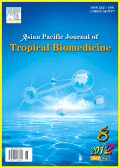
Asian Pacific Journal of Tropical Biomedicine
Exploring the Frontiers of Biomedicine in the Tropics.The Asian Pacific Journal of Tropical Biomedicine, published by Wolters Kluwer Medknow Publications, is a premier open-access journal dedicated to advancing research in the fields of tropical biomedicine. Launched in 2011 and fully embracing the open-access model since 2014, this journal has become an invaluable resource for researchers, professionals, and students alike. With an impact factor reflective of its Q3 ranking in the category of Biochemistry, Genetics and Molecular Biology (miscellaneous), it currently holds a Scopus rank of #49 out of 103, placing it in the 52nd percentile in its field. Covering diverse topics on biomedicine, the journal aims to disseminate significant findings and foster collaborative research initiatives across the Asian Pacific region and beyond. With its robust commitment to accessibility and quality, the Asian Pacific Journal of Tropical Biomedicine is a vital platform for promoting scientific knowledge and innovation.
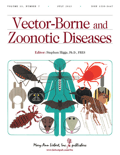
VECTOR-BORNE AND ZOONOTIC DISEASES
Innovating research to combat vector-borne and zoonotic threats.VECTOR-BORNE AND ZOONOTIC DISEASES is a prominent journal dedicated to advancing research in the fields of infectious diseases, microbiology, and virology, published by Mary Ann Liebert, Inc. With a rich history spanning from 2001 to 2024, this journal plays a critical role in disseminating cutting-edge research and insights regarding diseases transmitted by vectors and zoonotic pathogens. It has achieved notable rankings, including Q2 in the Infectious Diseases category and Q3 in both Microbiology and Virology as of 2023. The journal's emphasis on quality and relevance is further underscored by its established position—ranked 151st in Infectious Diseases and within the 43rd percentile in Virology according to Scopus. Although not an open-access journal, the publication ensures that its findings reach a broad audience of researchers, professionals, and students dedicated to tackling the challenges posed by these critical health issues. By providing a platform for innovative studies and discussions, VECTOR-BORNE AND ZOONOTIC DISEASES remains an essential resource for those at the forefront of disease research and public health strategies.
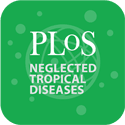
PLoS Neglected Tropical Diseases
Transforming research into solutions for tropical diseases.PLoS Neglected Tropical Diseases is a leading Open Access journal published by the Public Library of Science since 2007, dedicated to advancing research and awareness in the field of neglected tropical diseases. With an impressive 2023 impact factor reflected in its Q1 ranking in categories such as Infectious Diseases, Pharmacology, Toxicology and Pharmaceutics, as well as Public Health, Environmental and Occupational Health, this journal is recognized as a vital resource for researchers, healthcare professionals, and students alike. It is positioned prominently within the academic community, ranked in the top tier of journals according to Scopus, demonstrating its significant contribution to knowledge and innovation in global health. With its commitment to disseminating free and accessible scientific insights, PLoS Neglected Tropical Diseases plays a crucial role in addressing pressing health challenges and promoting a deeper understanding of diseases often overlooked in mainstream health discourse. For further information and to access its rich repository of articles, please visit the journal's website.